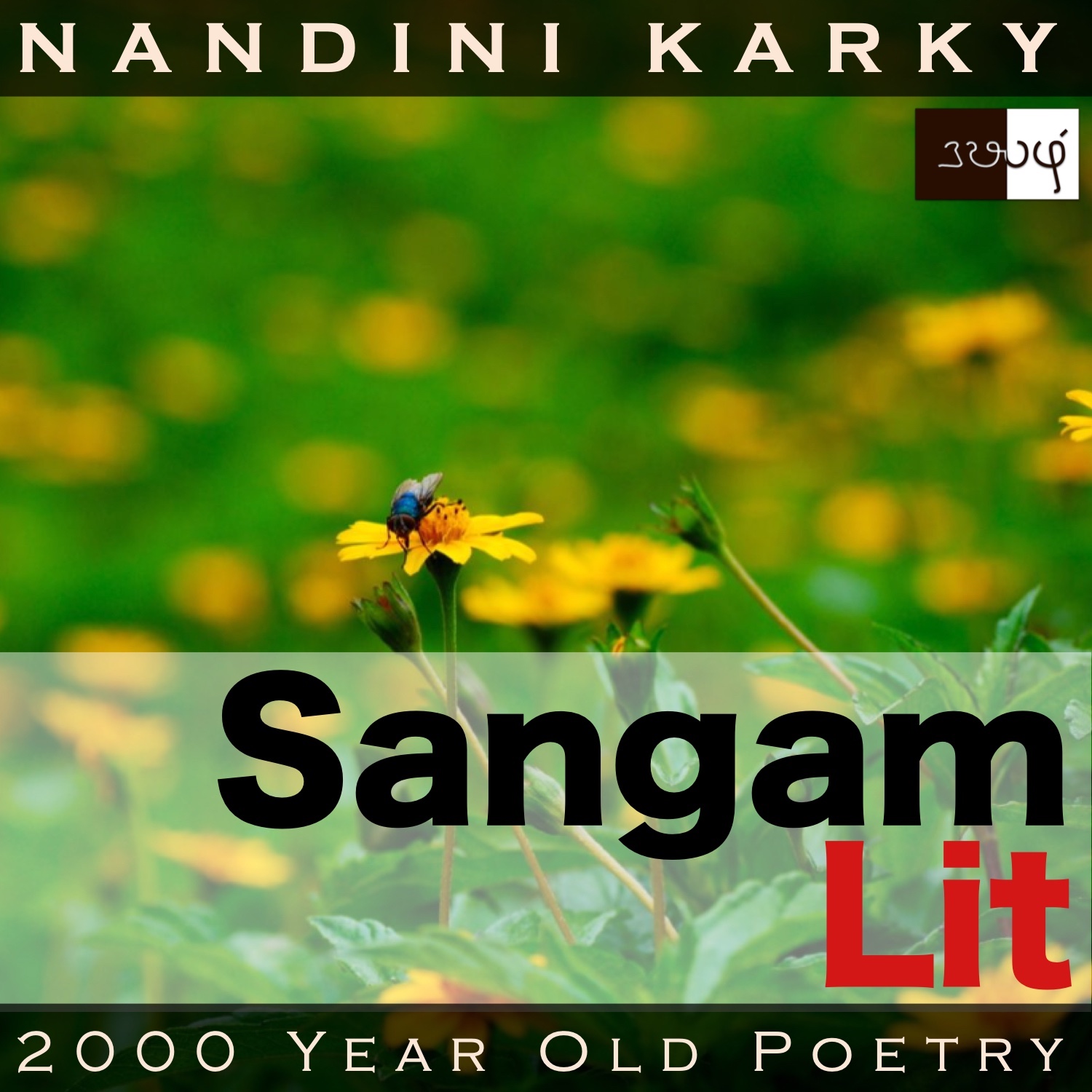Podcast: Play in new window | Download
Subscribe: Apple Podcasts | Spotify | Amazon Music | Android | iHeartRadio | TuneIn | RSS | More

In this episode, we relish the expressed ecstasy of being in love, as depicted in Sangam Literary work, Kurunthogai 2, penned by Iraiyanaar. The verse is situated in the mountain country of ‘Kurinji’ and speaks in the voice of a man to a bee, raising a question and revealing his passion.
கொங்கு தேர் வாழ்க்கை அஞ்சிறைத் தும்பி!
காமம் செப்பாது, கண்டது மொழிமோ:
பயிலியது கெழீஇய நட்பின், மயில் இயல்,
செறி எயிற்று, அரிவை கூந்தலின்
நறியவும் உளவோ, நீ அறியும் பூவே?
The minute I read the first line, the cells in my brain zinged as if I’m meeting a person, whom I had lost touch with, but one who was a familiar face in the past! But, knowing a face is one thing and knowing a person is something else entirely. Here, I got to know these lines truly. ‘கொங்கு தேர் வாழ்க்கை’ talks about ‘a life involving the selection of fine honey’ and just when we are wondering if the person addressed is some kind of ancient honey-taster, we glimpse at ‘அஞ்சிறைத் தும்பி’ and identify the one addressed as a ‘bee with beautiful wings’. Next is the intriguing phrase – ‘காமம் செப்பாது, கண்டது மொழிமோ’. When I first started this podcast, a Tamil scholar wished me with these very words, and only today, I gathered the full meaning of what was meant. Let’s delve into that in a while. A couple of expressions like ‘மயில் இயல்’ meaning ‘resemblance of a peacock’ and ‘செறி எயிற்று’ meaning ‘closely set attractive teeth’ seem to sketch a word-portrait of a fine lady. Ending with a pointed question ‘நறியவும் உளவோ, நீ அறியும் பூவே’, meaning ‘could there be this fragrance in the flowers you know?’, the verse teases our curiosity!
Being situated in the hills of ‘Kurinji’, verses like this tend to gravitate towards the theme of a happy union between the man and the lady. As predicted, this poem occurs in the context when the man and lady had met and fallen in love. When the lady’s shyness seems to prevent him getting closer to her, the man says to a buzzing bee, “O exquisite-winged bee, living a life of choosing fine honey, speak not words to please me but only the truth you see! Behold this maiden – the one who has a deep bond with me; the one resembling a peacock; the one with close-set, fine teeth. Among the flowers you know, could there be even one that has the fragrance of this maiden’s tresses?” With these words, the man expresses to a bee, his love for the lady, and tries to break in through the lady’s shyness with his words of praise.
Translation done, meaning understood, but is that enough? I’d say not! Why don’t we linger in this delightful place a little longer? Right at the beginning, the man’s words to the bee arrests our attention. He crowns the bee as a taster of honey. What a refreshing change from the negative connotation of a bee as one flitting from flower to flower! Here, the fact that a bee jumps from one flower to another, savouring a variety of pollen, and selecting the best of honey, is seen as its positive attribute. The next thing that captivates us is the phrase I mentioned earlier – ‘காமம் செப்பாது, கண்டது மொழிமோ’. As you might have caught in the translation, these words from the man tell the bee not to say something so as to please him but only the truth. Thinking tangentially, shouldn’t this statement be the cornerstone of research? Be it any scientific or artistic exploration, wouldn’t it be the best to keep aside notions of what would please the audience and present the truth and the truth alone?
Returning to the verse, what could be that truth the man is seeking from the bee? He clarifies by pointing to the lady, whom he talks of being close to him, and describes her resemblance to a dainty peacock, and also mentions her fine teeth. Speaking of which, unlike the ‘thorn-like teeth’ that we encountered in Natrinai verses, this reference is something even we can identify with. Cosmetic dentistry in the twenty-first century would nod in recognition, reflecting on the many requests they get to remove the gaps between teeth. Turning away from these attractive teeth, we hear the final question the man puts to the bee and that is, asking it, whether in its entire life of searching for honey, it has ever experienced the fragrance in his lady’s tresses in any other flower. While the bee is sure not to answer, the lady’s ears would delight in these words of celebration. Reflecting on that question to the bee, I see how I too am a bee, in this life of relishing honey in Sangam blooms many!




‘காமம் செப்பாது, கண்டது மொழிமோ’ is simply wow.This appreciation is opening many windows.Thank you,Nandhini Karky mam.